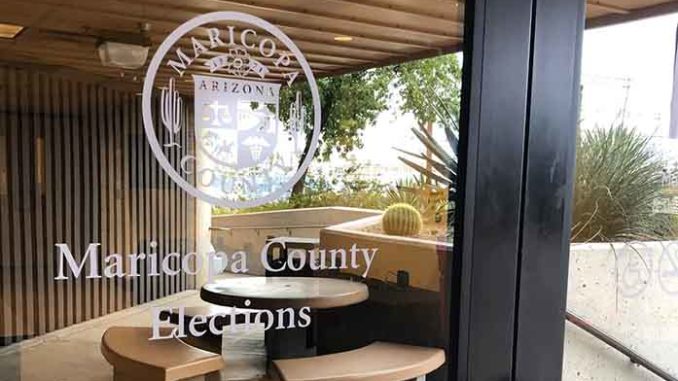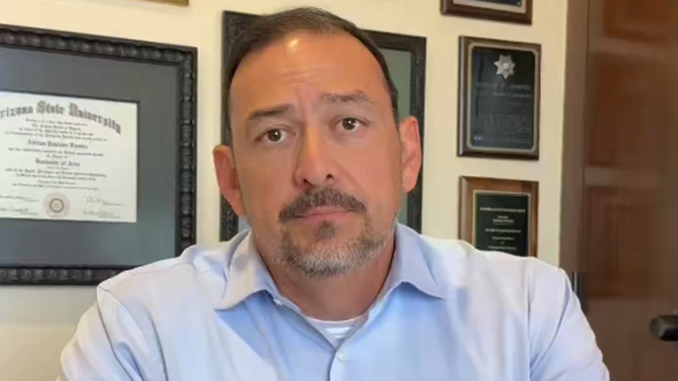
by Staff Reporter | Jan 9, 2026 | News
By Staff Reporter |
Senator Ruben Gallego is speaking out against the overthrow of Venezuela’s socialist president.
Gallego compared U.S. interventionism in Venezuela with the U.S. waging war in the Middle East, where Gallego deployed in the military.
“I lived through the consequences of an illegal war sold to the American people with lies,” said Gallego. “The American people did not ask for this, Congress did not authorize this, and our service members should not be sent into harm’s way for another unnecessary conflict.”
Gallego promised he would be introducing a bill to deny Trump the ability to intervene in foreign nations without congressional permission.
The senator also said in media interviews that it wasn’t up to the U.S. to determine who maintains power in Venezuela or other countries. Gallego predicted that Venezuelans would implement a more “leftist” government that’s more opposed to the U.S.
“This administration has zero clue what they’re doing. They’re basically following a really dumb man into a very dumb war potentially, and that creates very dumb outcomes,” said Gallego. “We’ve moved on from being the world cop to the world bully.”
Over the weekend the U.S. conducted a strike on Venezuela’s capital. Troops arrested Venezuela’s president, Nicolás Maduro, and his wife.
Maduro faces federal drug trafficking charges in New York: narco-terrorism conspiracy, cocaine importation conspiracy, possession of machine guns and destructive devices, and conspiracy to possess machine guns and destructive devices against the U.S. Maduro pleaded not guilty on Monday.
Contrary to what Gallego claimed, President Donald Trump hasn’t declared war in Venezuela. He confirmed as much in media interviews. Trump said he’s now in charge of Venezuela.
Despite corrections to his narrative, Gallego has continued to push the claim to the media that the U.S. declared war on Venezuela.
“When people are shooting and shooting back, that is war. That’s exactly what occurred here,” said Gallego. “They’re just trying to get people climatized to the idea of us going to war.”
Gallego said that while he believed it was “great” that Maduro was unseated, he doesn’t believe the U.S. had the right to interfere. The senator claimed that the Trump administration misled him in briefings by denying that the U.S. was conducting a regime change or declaring war on Venezuela.
“All this is one more excuse for us to either occupy Venezuela, take their oil, and more importantly you’re violating the Constitution of the United States,” said Gallego.
Gallego also did an interview in Spanish criticizing the Trump administration for providing Venezuela with a pathway to freedom.
Trump advised that Maduro’s successor, Delcy Rodriguez, will serve as interim president so long as she complies with his directives on running Venezuela.
“[I]f she doesn’t do what’s right, she is going to pay a very big price, probably bigger than Maduro,” the president said in an interview with The Atlantic on Sunday. “You know, rebuilding there and regime change, anything you want to call it, is better than what you have right now. Can’t get any worse.”
AZ Free News is your #1 source for Arizona news and politics. You can send us news tips using this link.

by Ethan Faverino | Jan 9, 2026 | News
By Ethan Faverino |
Maricopa County Elections’ latest newsletter, released January 1, 2026, delivered key updates for upcoming elections, including precinct boundary changes, opportunities to support upcoming elections, and important dates for the 2026 election cycle.
The Maricopa County Board of Supervisors recently approved 235 voting precinct changes, which took effect on January 2, 2026, eliminating precincts with zero voters, aligning boundaries with major freeways, reducing overall precinct sizes for better manageability, and minimizing splits across cities, towns, and school districts.
These adjustments aim to accommodate ongoing population growth across the county and ensure sufficient precinct capacity to support efficient in-person voting operations. Additionally, the Board established a new Justice Court District in the West Valley, named Canyon Trails.
Maricopa County Elections also continues its search for community partners willing to host Vote Centers for the 2026 election season. By providing a suitable space, hosts play a direct role in strengthening election access and supporting participation in the community.
Ideal Vote Center locations must meet the following requirements:
- Minimum room size of 1,600 square feet
- Full ADA accessibility
- Reliable power and air conditioning
- Ample parking to handle high voter traffic
Hosts may commit to one of several durations: 27 days, 12 days, 4 days, 2 days, or 1 day, depending on the election period and location needs.
For the City of Tempe, Maricopa County Elections will conduct an all-mail election on March 10, 2026. Under Arizona law, eligible voters will automatically receive a ballot by mail. The voter registration deadline for this election is February 9, 2026.
Replacement ballots will be available for in-person voting starting March 3, 2026, at the Tempe History Museum.
Maricopa County Elections serves as the filing officer for a range of countywide elected offices, including Justice of the Peace, Constable, Judges seeking retention, Special Taxing Districts, and Precinct Committeemen.
To assist prospective candidates, Maricopa County Elections will host the following virtual training sessions:
- January 13 and February 5, 2026 – General candidate training
- January 15 and February 3, 2026 – Precinct Committeeman training
Ethan Faverino is a reporter for AZ Free News. You can send him news tips using this link.

by Matthew Holloway | Jan 9, 2026 | News
By Matthew Holloway |
Scammers are targeting veterans with fraudulent fees to register for the National Veterans Golden Age Games, prompting a Federal Trade Commission warning that the VA-hosted event is, and always has been, free for entrants to compete and caregivers, coaches, and loved ones to watch.
The alert was issued in a December 19th Consumer Notice published on the agency’s website.
In its alert, the FTC said veterans have reported finding websites or social media pages that purport to charge a fee to register for the Golden Age Games. According to the notice, these offers are fraudulent and not affiliated with the U.S. Department of Veterans Affairs. Registration for the Games is handled only through VA.gov using verified veteran credentials.
Local veterans and staff with the Phoenix VA Health Care System have long participated in the National Veterans Golden Age Games, with the system’s adaptive sports clinic helping prepare competitors for the event. In June, VA officials in Phoenix publicly recognized a team of Arizona veterans who won multiple medals at the Games. This local involvement underscores the importance of protecting veterans from bad actors online who charge illegitimate fees for an event that is officially free.
The National Veterans Golden Age Games is organized by the VA’s Veterans Sports Programs to promote health, wellness, and physical activity among older veterans. The FTC notice states the Games are free for veterans, coaches, caregivers, and spectators, and that official registration for the 2026 Games, scheduled for June 27 through July 2 in Tampa, Florida, will open January 28, 2026. Registration is only available through VA.gov using an ID.me account. Any online offer claiming immediate registration or requiring payment is likely a scam.
FTC Consumer Sentinel Network data show that Arizona residents filed more than 54,000 fraud reports in 2024, including thousands from military consumers, resulting in more than $336 million in reported losses statewide. Fraud involving imposter schemes, such as fake government fees or event registrations, was one of the top complaint categories among Arizona consumers.
The FTC recommends registering only through official VA channels and avoiding sharing login information or personal credentials with third-party websites. Veterans and families encountering potential fraud schemes are encouraged to report them through ReportFraud.ftc.gov.
The Arizona Attorney General’s Office also maintains a scam-reporting portal and consumer alerts for veteran-related fraud, directing residents to file complaints through the AG Office’s website or the FTC’s federal system.
Matthew Holloway is a senior reporter for AZ Free News. Follow him on X for his latest stories, or email tips to Matthew@azfreenews.com.

by Staff Reporter | Jan 8, 2026 | News
By Staff Reporter |
The Department of Justice (DOJ) sued Arizona for refusing to turn over voter registration records.
Arizona joins 22 other states and the District of Columbia facing legal action from the DOJ for withholding access to the voter rolls.
A press release issued on Tuesday from the DOJ also named Connecticut as the latest to be sued.
“Accurate voter rolls are the foundation of election integrity, and any state that fails to meet this basic obligation of transparency can expect to see us in court,” said Attorney General Pam Bondi.
The requested records would include each voter’s full name, date of birth, residential address, and either their state driver’s license number, last four digits of their Social Security number, or HAVA unique identifier.
The DOJ’s lawsuit asserts the agency maintains legal authority under the Civil Rights Act (CRA) to access any election records it desires.
“If the custodian to whom the written demand is made refuses to comply, the CRA requires ‘a special statutory proceeding in which the courts play a limited, albeit vital, role’ in assisting the Attorney General’s investigative powers,” stated the lawsuit.
The DOJ requested the records from Secretary of State Adrian Fontes last July, and again in August. Both times Fontes responded with refusals, claiming that state and federal privacy laws prevent him from turning over the requested records.
Fontes rejected another follow-up request by the DOJ last month. The secretary of state claimed that voter rights to privacy trumped the federal government’s chief authority over elections.
“Arizona voters also have important privacy rights that cannot be infringed because they choose to exercise their constitutionally protected voting rights,” said Fontes.
Fontes said in a statement to Democracy Docket that he would rather be imprisoned than cooperate with the Trump administration.
“They’re going to have to put me in jail if they want this information,” said Fontes.
In a video statement on X, Fontes again declared compliance would break state and federal law.
“Pound sand,” said Fontes.
Arizona Attorney General Kris Mayes backed Fontes’ take on privacy laws negating the authority of election oversight laws.
“Both state and federal law prohibit the unrestricted release of Arizona’s complete voter registration database to the DOJ,” said Mayes.
Fontes also published a blog post on Tuesday commemorating the fifth year to pass since the January 6 invasion of the Capitol. The secretary of state claimed that the government remains under active threat, and compared the political climate to the Civil War era.
“Today’s challenges — polarization, misinformation from the top down, foreign interference — are real and daunting. But they pale in comparison to the existential crisis of 1864, when the nation itself was at risk of dissolution. If democracy could survive that, it can survive now — provided we do our part,” said Fontes. “Confidence in our electoral system is not naïve; it is necessary. Election officials across the country are working tirelessly to secure voting infrastructure, expand access, and ensure transparency. These efforts deserve not only our trust but our active participation. Cynicism is easy. Engagement is harder — but it is the only way forward.”
AZ Free News is your #1 source for Arizona news and politics. You can send us news tips using this link.

by Ethan Faverino | Jan 8, 2026 | Economy, News
By Ethan Faverino |
As Arizona lawmakers prepare to convene for the 2026 legislative session, a leading nonpartisan think tank is warning of a demanding agenda driven by fiscal discipline, persistent housing shortages, and critical water policy decisions.
Katie Ratlief, Executive Director of the Common Sense Institute (CSI), emphasized the need for urgent action from the Legislature and Governor Katie Hobbs to address these issues. In a recent report by The Center Square, Ratlief highlighted that the session will require decisive leadership to tackle spending trends, affordability barriers, and the state’s long-term water security.
Arizona’s budget has expanded significantly over the past decade, rising from approximately $10 billion to nearly $18 billion, with $6 billion of that increase occurring in just the last five years. Ratlief urged policymakers to rein in spending increases and reassess recent commitments to determine whether they remain necessary, warning against expenditures outpacing economic growth.
Housing affordability remains a top concern for CSI Arizona, with the latest quarterly report underscoring ongoing challenges despite some cooling in the market. The average home price stands at $426,164—$53,400 more expensive than pre-pandemic trends—leaving households facing high costs amid elevated mortgage rates.
According to CSI Senior Economist and Research Analyst Zachary Milne, Arizonans now need to work more than 64 hours per month, at the average wage, just to afford a typical home payment, significantly up from the historical average of 45 hours.
Real-time estimates show an instantaneous housing shortfall of 52,846 units in Q2 2025, a 6.9% improvement from the revised 56,812 units in 2024. Arizona faces a cumulative housing deficit of 121,334 units, as of 2024, reflecting years of inadequate construction relative to population growth.
Ratlief believes the housing shortfall is not the result of state policy but of holdups originating within cities, noting that local governments control permitting, building codes, and enforcement—factors that can significantly slow housing development.
CSI revealed that most Arizona counties—including Maricopa, with a projected deficit of 34,737 units—are falling behind demand. Even with recent improvements in permitting, Maricopa County is still building thousands of units short of what is needed annually.
Water policy will also dominate discussions this legislative session, as ongoing negotiations over the Colorado River allocations approach a pivotal February 14, 2026, deadline set by the U.S. Department of the Interior.
This is viewed as likely the final opportunity for the seven basin states to reach a consensus agreement on sharing the river’s water before current operating guidelines expire at the end of the year. With Arizona’s unique constitutional requirement, any agreement reached will require legislative approval, setting the stage for intense debate in the 2026 session. Ratlief indicated that if states finalize a deal, the Legislature will debate and vote on authorizing the Department of Water Resources to sign on, potentially shaping Arizona’s water future for decades.
Ethan Faverino is a reporter for AZ Free News. You can send him news tips using this link.

by Matthew Holloway | Jan 8, 2026 | News
By Matthew Holloway |
Arizona Congressman Abe Hamadeh (R-AZ-08) and Nevada Rep. Susie Lee (D-NV-03) have introduced the VA Medical Center Facility Transparency Act, bipartisan legislation that would provide lawmakers with clearer information on the performance of Veterans Affairs medical facilities nationwide.
The bill was announced publicly in a press release on December 22, 2025, as part of lawmakers’ efforts to support bipartisan solutions to issues facing veterans.
According to the press release, the act is designed to help Congress better evaluate VA medical center operations and enable more effective responses to veterans’ health care concerns. The legislation would require greater transparency in the management and operations of VA medical facilities, giving federal lawmakers the data and insight needed to identify performance issues.
The VA Medical Center Facility Transparency Act is not wholly novel; a similar bill under the same name was introduced in 2023 by Hamadeh’s predecessor, Debbie Lesko, in partnership with Rep. Susie Lee and with support from the Veterans of Foreign Wars (VFW).
A notable element of this version of the bill is a three-year sunset provision, meaning the policy would expire after three years unless Congress votes to renew it. This provision was added to allow lawmakers to evaluate the legislation’s effectiveness before considering reauthorization.
In announcing the bill, Hamadeh emphasized its importance for Arizona’s veteran population, including those living near Luke Air Force Base, stating that it would allow Congress to “better assess the strengths and weaknesses of VA medical facilities” and take appropriate action. Hamadeh added that the legislation should “elevate the quality-of-care veterans receive,” according to a statement shared on social media.
Lee framed the bill as part of her responsibility to ensure that veterans “receive the care and benefits that they have earned,” and said the transparency the bill seeks will give policymakers the information they need about how the VA operates.
This legislation is the latest in a series of veterans-focused measures introduced by Hamadeh. Earlier in 2025, the U.S. House of Representatives unanimously passed two other bipartisan bills he sponsored: the Edith Nourse Rogers STEM Scholarship Opportunity Act, aimed at expanding education opportunities for veterans, and the Health Professionals Scholarship Program (HPSP) Improvement Act of 2025, which addresses staffing challenges at VA medical facilities.
Arizona Veterans’ Affairs medical facilities have been subject to scrutiny in recent years over issues such as waiting times, access to care, and administrative transparency. Past federal laws aimed at improving veterans’ access to care, such as the Veterans’ Access to Care through Choice, Accountability, and Transparency Act of 2014, came in response to reports of systemic problems at certain VA facilities.
By giving lawmakers better data on VA facility performance, the new transparency act could shape future federal oversight and policy decisions affecting veteran health care delivery.
Matthew Holloway is a senior reporter for AZ Free News. Follow him on X for his latest stories, or email tips to Matthew@azfreenews.com.






